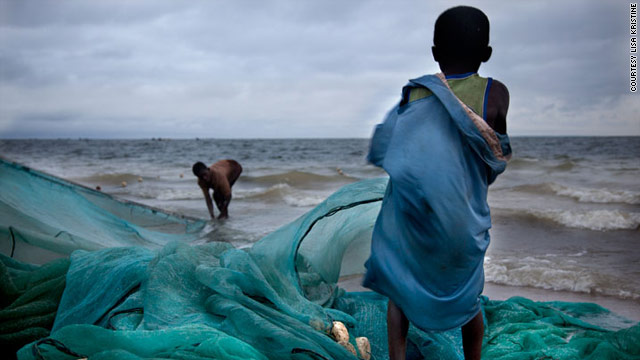
This image showing enslaved fishing boys in Ghana was one of the first to appear on the Freedom Project.
December 19th, 2011
03:44 PM ET
(CNN) - Since its launch in March, the CNN Freedom Project has helped shine a spotlight on all aspects of modern-day slavery and spurred action from governments, corporations and individuals.
CNN reported on sex slaves and bonded workers, children and adults caught in despair, and the inspirational against-all-odds work of individuals and organizations fighting the trade.Nearly 2,000 people have come out of slavery, either directly or indirectly, as a result of the hundreds of stories broadcast on air and published online.
From the richest cities to the poorest villages, corruption and crime was exposed, the hidden slaves were given a voice, and in some cases were freed to try to regain normal lives.
All too often the story was wearily familiar - the most vulnerable in a society preyed on by the most wicked. But the anti-traffickers provided hope where it appeared lost. And Freedom Project gave everyone a chance to help, to join in.
There are no precise figures in the extent of modern-day slavery but the International Labor Organization and respected abolitionists like Kevin Bales and Siddharth Kara put the global number of slaves at between 10-30 million worldwide.
The United Nations estimates the total market value of human trafficking at 32 billion U.S. dollars.
In March, India's Labor Secretary Prabhat C. Chaturvedi admitted the country had an extensive bonded labor problem after watching a CNN expose on brick workers in Utter Pradesh. They were tricked into working - tempted by the prospect of more money with a 1,000 rupee ($22) ‘advance’ - and then forced to pay off a debt.
Chaturvedi denied it was slave labor but just three months later Indian authorities helped free more than 500 people who had been physically abused at another brick factory.
In Egypt’s lawless desert region migrants, from places like Somalia heading to what they believe will be a better life in Israel, are held captive by the Bedouins they hire to guide then across the Sinai. The price of freedom is often more than their families can afford and there was some evidence of captives being killed for their organs.
Just days after ‘Death in the Desert’ aired on TV and online, more than 500 people were freed.
CNN’s Dan Rivers exposed the link between shops in the first world and the slavery in the developing world.
Travelling to Cambodia, he was encouraged to track down Chanary, the trafficked daughter of a woman who had escaped her traffickers - a task that would see an angry face-off with the agency owner that attracts young workers with promises of good pay and then keeps them bonded.
A-list entertainment stars also joined the fight with Demi Moore traveling to Nepal where she met 2010 CNN Hero of the Year Anuradha Koirala and some of the thousands of women and girls Koirala’s organization has rescued from forced prostitution.
One of India’s biggest stars, Anil Kapoor, explored the despair in some Indian villages where girls are sent into prostitution by their families.
Rapper and Hollywood actor Common visited Haiti where an estimated 300,000 children are working as domestic servants.
And acclaimed director Robert Bilheimer said he believes the world could be reaching an anti-slavery tipping point after spending four years on five continents filming his ‘Not My Life’ documentary.
After the documentary CNN’s Sara Sidner followed up by reporting on a young woman in Cambodia who had been repeatedly beaten and raped. Shortly after the story aired, Cambodian authorities said they would be making arrests.
But it was not just stars who got involved. iReporters from around the globe joined in too.
In South Korea, an entire school in South Korea took a stand to end slavery.
Others made efforts to educate their own communities that slavery was not history but a modern horror that can be tackled.
And iReporters in 32 countries, from Nigeria to Sweden to Indonesia, made symbolic paper airplanes to spread the word about human slavery.
At Wyndham hotels, Mary Falvey, executive vice president of human resources, says that the hotel chain is training all employees to recognize sex traffickers and their victims.
Some of the biggest voices in the anti-slavery movement have added their weight to the Freedom Project.
Trafficking expert Siddharth Kara explained the juju oaths which keep Nigerian women tied to their captors through fear as they are trafficked to rich European nations.
He also explained the steps anyone can take to combat human trafficking in their own community wherever they live.
Across the world attitudes are changing. With that comes change in law enforcement, too.
In some countries young women forced to sell sex are considered victims of trafficking rather than prostitutes.
In India, women rescued by Anuradha Koirala are given medical and mental help and work training. In California, pimps are arrested as traffickers if they sell underage girls for sex.
And in Barcelona, police showed CNN how they cracked two Chinese trafficking rings – one for the sex trade and one that used people in sweat shops making fake designer goods and another.
In cracking the sex ring 39 people were arrested and 30 women freed. In busting the sweat shop operation 150 people were arrested and 450 victims freed.
Isabel’s story of a childhood destroyed by domestic slavery sparked outrage in her native Taiwan.
In 2012 the Freedom Project will continue shining a light in the dark corners, pushing for change and highlighting the anti-slavery fight.

No comments:
Post a Comment